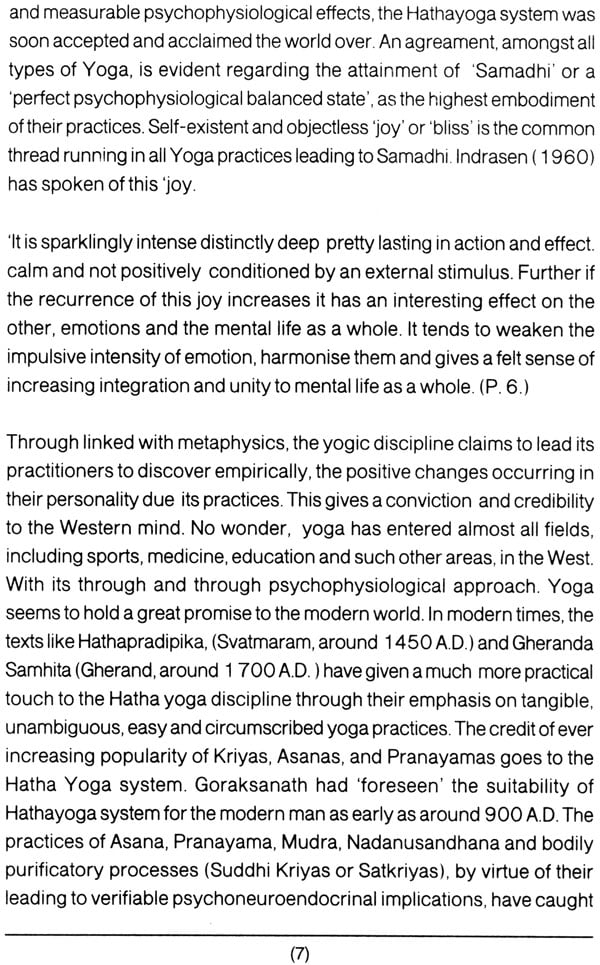
Yoga and Modern Psychology
Book Specification
| Item Code: | IDJ350 |
| Author: | Prof. R.S. Bhogal |
| Publisher: | Kaivalyadhama Samiti Lonavla |
| Language: | English |
| Pages: | 46 |
| Cover: | Paperback |
| Other Details | 8.5 inch x 5.5 inch |
| Weight | 60 gm |
Book Description
Introduction
Man's native urge to perceive the very purpose of the 'riddle' of life and his longing for a better 'Mentospiritual life' have probably, resulted in the origin of various philosophical systems. Modern psychology, an off shoot of Western philosophy, in its attempt to look more scientific seems to have become divorced from these metaphysical yet practical quests. Moreover, given its limited scope and the premise of understanding 'behavior' through empirical approach, as well as its ultimate goal of 'social adjustment' many an existential problem such as nature and constitution of personality as well as very basic principles, relating the purpose of human existence, seem to have escaped due attention. Indrasen (1960) has stated, 'Most part of psychological knowledge is limited to the relations and interactions of human personality and environmental. As to what personality is its nature and constitution as a fact. We have not had sufficient curiosity, nor exploration and systematic study (P.1) Yoga, often termed as Indian psychology, not only deals with these problems convincingly but also delves deeper into the psycho physiological recesses of human personality and culminates into the highest embodiment of human personality and culminates into the highest embodiment of human existence variously known as 'Self realization', 'Samadhi', 'Moksa', 'Salvation', 'Liberation', 'Nirvana', and the like.
In they're epistemological on to logical and methodological approaches. The disciplines of Yoga and modern psychology evidently differ to such an extent that one wonders if there are any points of agreement between them. However their common interest in solving the existential problem of understanding, controlling and directing human behavior makes them worthy candidates for a comparative study and thus raises a hope of developing a pragmatic synthesis between these two sciences. Of late, the co-operation between the two has been increasingly evident. Modern psychology is lending itself more and more to introspectionism, especially in understanding mind-body relationship? So also, Yoga experts are becoming more and more receptive to rigorous scientific investigations for an objective assessment of psycho physiological effects of Yoga. In the process there are emerging certain points of agreement useful for forging a synthesis, which in turn may enrich both the sciences. Before exploring the possibility of such a synthesis, it must, however be noted that the basic assumptions, objectives and methodology of modern psychology are based on modern European naturalistic rationalism. Yoga, often referred to as Indian psychology, on the other hand, has its base in Samkhya, one of the six intuitive thought systems better described as 'Darsanas'.
| Introduction | 3 |
| Yoga: Concept, Brief History and Scope | 4 |
| Concept of Nadi and Prana in Hatha Yoga | 5 |
| Liberation-The Yogic Perspective | 11 |
| Internalized Awareness: The Central Background of the Yogic Liberation | 13 |
| Meditation-The Great Path to 'Internalized Awareness' | 14 |
| Some Applied Vistas of Yoga | 15 |
| Modern Psychology | 21 |
| Yoga | 25 |
| Psychology | 27 |
| Can Psychology Study Yoga? | 28 |
| Why a Co-operation or A Synthesis? | 29 |
| Scope of the Synthesis | 30 |
| Conclusion | 39 |
| Acknowledgement | 40 |
| References | 41 |









